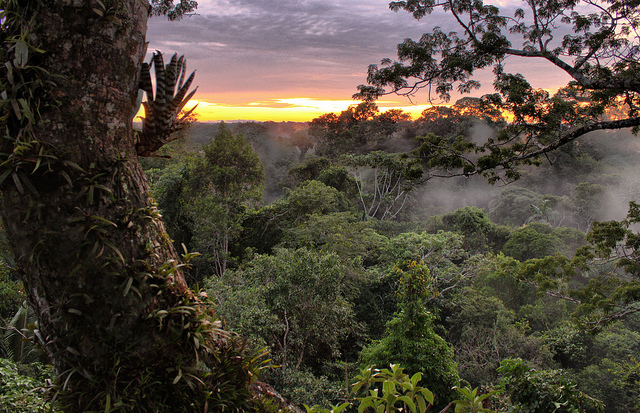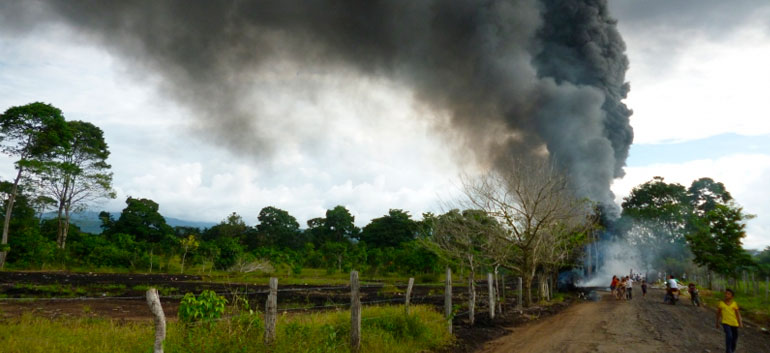by Deep Green Resistance News Service | Jan 16, 2015 | Defensive Violence, Obstruction & Occupation
By Mongabay
Indigenous leaders are calling for the release of six tribesmen implicated in a raid on an oilfield in Eastern Ecuador that left six soldiers injured, reports Andina and El Comercio.
According to Ecuador’s defense ministry, on January 6th a group of Waorani (Huaorani) tribesmen armed with spears, bows and arrows, blowguns, and firearms seized a facility run by Petrobell in Arajuno canton, in Pastaza province. The action shut down production at the oilfield, which normally produces 3,200 barrels a day.
The army then stormed the facility, resulting in clashes that led to six soldiers suffering gunshot wounds. No one was reported killed.
The defense ministry said the arrests were necessary to stop “looting” and disruption of oil production. The Waorani have been in custody since then.
However Franco Viteri, head of the Confederation of Indigenous Nationalities of the Ecuadorian Amazon (CONAIE), is calling for the men to be released, arguing that they were defending their traditional territory from incursions by oil companies, which have caused substantial damage to forests and indigenous communities in eastern Ecuador in recent decades.
“For 40 years, oil companies, with the consent of the State, have been smashing, looting and sabotaging the good life of indigenous peoples, disrupting the lifestyle of the Waorani people, a situation that has… escalated conflicts,” he said in a statement.
Petrobell is a subsidiary of Synergy Group Corp., a conglomerate headquartered in Brazil.
From Mongabay: “Amazon tribe attacks oilfield in Ecuador“

by DGR News Service | May 22, 2014 | Indigenous Autonomy, Mining & Drilling
By Agence France-Presse
The license comes just days after a petition for a referendum on the project was rejected by the country’s election authorities.
The action, signed by Environment Minister Lorena Tapia, gives a state company, Petroamazonas, rights to develop an oil field in part of the forest designated a UNESCO Biosphere Reserve.
Home to two indigenous tribes that have resisted contact with the outside world, the rainforest park covers an expanse of more than 9,800 square kilometers [3784 square miles] between two rivers.
The field, known as Tiputini, is part of a vast bloc that lies partially within the park with proven reserves of 920 million barrels of crude.
Petroamazonas was also granted a license to develop the Tambococha field, which lies outside the park but within the same oil development bloc.
Yasunimos, an environmentalist group, has fought government plans to open the park to oil development, gathering what it said were nearly 728,000 signatures on a petition to put it to a referendum.
But on May 9, Ecuador’s National Electoral Council invalidated half the signatures and rejected the petition, clearing the way for Thursday’s action.
The decision, however, could be appealed to the country’s constitutional court.
In October, Ecuador’s Congress approved a government plan to develop the Yasuni oil reserves, on the promise that revenues would be used to eradicate poverty.
From Physorg: http://phys.org/news/2014-05-ecuador-oil-amazon-reserve.html
by DGR News Service | Apr 27, 2014 | Obstruction & Occupation, Toxification
By Dan Collyns / The Guardian
Around 500 Achuar indigenous protesters have occupied Peru’s biggest oil field in the Amazon rainforest near Ecuador to demand the clean-up of decades of contamination from spilled crude oil.
The oilfield operator, Argentine Pluspetrol, said output had fallen by 70% since the protesters occupied its facilities on Monday – a production drop of around 11,000 barrels per day.
Native communities have taken control of a thermoelectric plant, oil tanks and key roads in the Amazonian region of Loreto, where Pluspetrol operates block 1-AB, the company said on Thursday.
Protest leader, Carlos Sandi, told the Guardian that Achuar communities were being “silently poisoned” because the company Pluspetrol has not complied with a 2006 agreement to clean up pollution dating back four decades in oil block 1-AB.
“Almost 80% of our population are sick due to the presence of lead and cadmium in our food and water form the oil contamination,” said Sandi, president of FECONACO, the federation of native communities in the Corrientes River.
Pluspetrol, the biggest oil and natural gas producer in Peru, has operated the oil fields since 2001. It took over from Occidental Petroleum, which began drilling in 1971, and, according to the government, had not cleaned up contamination either.
Last year, Peru declared an environmental state of emergency in the oil field.
But Sandi said the state had failed to take “concrete measures or compensate the native people” for the environmental damage caused.
He claimed Achuar communities were not receiving their share of oil royalties and the state had failed to invest in development programmes in the Tigre, Corrientes and Pastaza river basins that had been most impacted by oil exploitation.
He said the Achuar were demanding to meet with the central government to talk about public health, the environment and the distribution of oil royalties.
“We aren’t against oil exploitation or development we are calling for our rights to be respected in accordance with international laws,” he said.
“Conversations are under way to bring a solution to the impasse,” Pluspetrol told Reuters. “A government commission is there and we hope this is resolved soon.”
Over the past year, the Peruvian government has declared three environmental emergencies in large areas of rainforest near the oil field after finding dangerous levels of pollution on indigenous territories.
Peru’s Environment Ministry said in a statement last week that a commission formed by government and company representatives has been assigned to work with communities to tackle pollution problems and other concerns.
From The Guardian: http://www.theguardian.com/environment/2014/apr/25/indigenous-protesters-occupy-perus-biggest-amazon-oilfield

by DGR News Service | Mar 18, 2014 | Toxification
By Reuters
A major oil pipeline owned by Sunoco Logistics Partners LP leaked thousands of gallons of crude oil into a nature preserve in southwest Ohio late on Monday.
Between 7,000 and 10,000 gallons (26,000-38,000 liters) of sweet crude leaked into the Oak Glen Nature Preserve about a quarter of a mile from the Great Miami River, according to early estimates from the Ohio Environmental Protection Agency.
The leak, which occurred on a line operated by Mid-Valley Pipeline Co, a division of Sunoco, was discovered at 8:20 p.m. EDT on Monday (0020 GMT Tuesday). The company shut the line, which helped reduce the pressure of the leaking oil, an EPA spokeswoman said, but it was unclear if oil was still spewing from the pipe.
Some oil reached a wetland a mile away and on Tuesday, clean-up crews were preparing to vacuum the wetland, located 20 miles north of Cincinnati.
The oil did not appear to have reached the Great Miami River, though tests were still being completed, the EPA said.
“The extent of impact to the resource is currently unknown,” said a statement from the Great Parks of Hamilton County, which oversees the Oak Glen preserve. “The EPA is assessing the situation to determine appropriate action.”
Sunoco was not immediately available for comment.
The pipeline is part of Sunoco’s mid-west system that runs about 1,000 miles from Longview, Texas to Samaria, Michigan, providing crude oil to a number of refineries, primarily in the U.S. Midwest.
Read more from The Raw Story: http://www.rawstory.com/rs/2014/03/18/major-oil-pipeline-leaks-more-than-7000-gallons-of-crude-oil-into-ohio-nature-preserve/

by Deep Green Resistance News Service | Jan 4, 2014 | Colonialism & Conquest, Property & Material Destruction
By Andrew Wight & Taran Volckhausen / Colombia Reports
Colombia’s second largest rebel group the ELN detonated explosives Wednesday at four crude oil holding pools along the Caño Limon – Coveñas pipeline in the state of North Santander.
A large blaze caused by the attacks created panic in the local population, who were forced to flee their homes, according to local media reports.
Authorities were taking measures to prevent further environmental damage after the attacks as well as reconstruct the damaged holding pools.
The attack marks the first attack by the ELN in 2014, although the rebel group has been coordinating attacks on Colombia’s oil production infrastructure for the past few months, declaring war against multinational oil companies operating in the country in November.
In a statement released on the ELN website Tuesday, Colombia’s second largest guerrilla group declared war on the multinationals and oil companies “plundering” the country’s natural resources.
The ELN’s Eastern War Front Commander, Manuel Vasquez Castaño, confirmed that a slew of recent attacks directed at Colombia’s oil infrastructure have been intended to hurt the pockets of multinationals active in the country.
Once again, we reaffirm our belligerent stance to confront multinationals and their repressive apparatus: the plunderers and exploiters of natural resources,” he said. “Colombia is a colony of North American imperialism — bourgeois elites in power sold to the highest bidder and in the name of democracy deliver natural resources to their Yankee masters.
The statement went on to discuss the high prices of Colombia’s internal combustible market, which lead to nationwide strikes in the trucking sector this past summer and have been sited by farm organizers involved in ongoing negotiations with the government as a reason for the financial insolubility of the agricultural market.
“We are one of the top oil-producing countries worldwide,” said Vasquez, “but Colombia has (some of) the world’s most expensive gasoline.”
The rebel group has asked for broad talks along the lines of the peace deal currently being negotiated in Havana, Cuba between government officials and the FARC, Colombia’s largest rebel group.
But despite agreeing to initiate the process, the Colombian government has yet to reach out to the ELN central command, which has repeatedly called for the start of discussions, and recently launched an offensive against oil and gas pipelines in rural Colombia, in what is believed to be a measure to pressure the Colombian government into talks.
Despite the ELN’s efforts, Colombia’s state-owned Ecopetrol oil company reported a net profit of $2.05 billion in the third quarter of 2013 and record levels of oil production.
The Colombian government has yet to respond to the ELN’s most recent announcement, and hasn’t indicated that any plan to develop talks will be forthcoming.
The ELN, which continues to employ the anti-capitalist rhetoric of its origins as a Catholic-Marxist revolutionary group, has since become dependent on the illicit mining and gold trade, running operations throughout the country that exploit Colombia’s rural poor and generate sizable revenue streams for the group’s other activities.
From Systemic Capital



